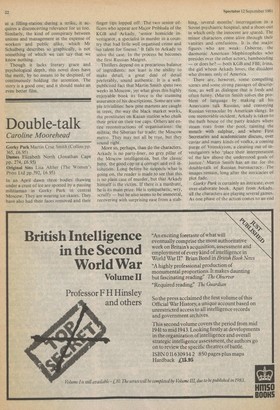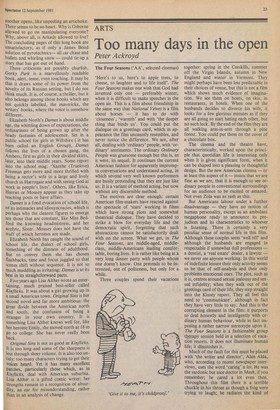Double-talk
Caroline Moorehead
Gorky Park Martin Cruz Smith (Collins pp. 365, £6.95) Dames Elizabeth North (Jonathan Cape pp. 274, £6.95) Original Sins Lisa Alther (The Women's Press Ltd pp.592, £6.95) In an April dawn three bodies thawing under a crust of ice are spotted by a passing militiaman in Gorky Park in central Moscow. They are wearing ice skates. They have also had their faces removed and their finger tips lopped off. The two senior officers who appear are Major Pribluda of the KGB and Arkady, 'senior homicide investigator, a specialist in murder in a country that had little well organised crime and no talent for finesse.' It falls to Arkady to solve the case. In the process he becomes the first Russian Maigret.
Thrillers depend on a precarious balance of ingredients: not least is the ability to make detail, a great deal of detail preferably, sound authentic. It is a wellpublicised fact that Martin Smith spent two weeks in Moscow, yet what gives this highly enjoyable book its force is the stunning assurance of his descriptions. Some are simple trivialities: how pine martens are caught in trees, the way the black market works, the prostitutes on Kazan station who chalk their price on their toe caps. Others are entire reconstructions of organisations: the militia; the Siberian fur trade; the Moscow metro. They may not all be true, but they sound right.
More so, perhaps, than do the characters. Arkady is no party-liner, no grey pillar of the Moscow intelligentsia, but the classic hero, the good cop in a corrupt and evil institution. Long before he suspects what is going on, the reader is made to see that this is no plain case of murder, but that Arkady himself is the victim. If there is a manhunt, he is its main prize. He is sympathetic, wry, scruffy — but he also seems to be immortal, recovering with surprising ease from a stab bing, several months' interrogation in a Soviet psychiatric hospital, and a shoot-out in which only the innocent are spared. The minor characters come alive through their vanities and confusions. It is the major figures who are weak: Osborne, the daemonic American Mephistopheles who presides over the other actors, bamboozling — or does he? — both KGB and FBI; Irina, the girl whom Arkady loves, the dissident who dreams only of America.
There are, however, some compelling scenes and some strong passages of description, as well as dialogue that is fresh and often funny. (Martin Smith solves the problem of language by making all his Americans talk Russian, and conveying Russian vernacular by American slang). In one memorable incident, Arkady is taken to the bath house of the party leaders where steam rises from the pool, tainting the mouth with sulphur, and where First Secretaries and academicians discuss, over caviar and many kinds of vodka, a coming purge of Vronskyism, a cleaning out of investigators who 'place their interpretation of the law above the understood goals of justice.' Martin Smith has an ear for the double-talk of Russian bureaucracy. The images remain, long after the intricacies of plot fade.
Gorky Park is certainly an intricate, even over-elaborate book. Apart from Arkady, all the characters are playing several games. As one phase of the action comes to an end another opens, like unpeeling an artichoke. There seems to be no heart. Why is Osborne allowed to go on manipulating everyone? Why, above all, is Arkady allowed to live? The concluding pages of ;this long book are unsatisfactory, as if only a James Bond solution of pyrotechnics— all car chase and bullets and whirling snow — could tie up a story that has got out of hand.
These criticisms are possibly churlish.
Gorky Park is a marvellously readable book, alert, tense, even touching. It may be that it draws some of its power from the novelty of its Russian setting, but I do not think much. It is, of course, a thriller, but it also belongs among those books which are not quickly labelled, the mavericks, the writers' books, where the voice is somehow different.
Elizabeth North's Dames is about middle age, the whittling down of expectations, the ordinariness of being grown up after the heady fantasies of adolescence. Set in a public school for girls in Wiltshire ( it has been called an English Group), Dames follows the lives of a chosen gang, the Ambers, first as girls in their divided skirts, later, into their middle years. Some report Into the school mag: `Xanthe (Truelove) Freeman gets more and more thrilled with being a rector's wife in a large and lively church in Harrogate and with seeing God at work in people's lives'. Others, like Erica, Harriet or Mousey appear as they take up teaching posts or have affairs.
Dames is a fond evocation of school life, of its intimacies and idiosyncracies, which is Perhaps why the clearest figures to emerge are those that are constant, like Miss Bedford the knowing headmistress, and her acolyte, Sister. Mousey does not have the stuff of which heroines are made.
Elizabeth North has caught the sound of school life, the dialect of school girls, something of the dimness of adulthood.
But to convey them she has chosen flashbacks, time and focus juggled so that scenes shift without sequence. It is not so much muddling as irritating: Dames is at its best in its straightforward parts.
Five years ago Lisa Alther wrote an entertaining, much praised best-seller called Kinflicks. It was about a girl growing up in a small American town. Original Sins is her second novel and far more ambitious: the great divide between the American north and south, the confusion of being a stranger in your own country. It is something Lisa Alther knows well for, like her heroine Emily, she moved north at 18 to go to college. She has never really been back.
Original Sins is not as good as Kinflicks. It is too long and some of the sharpness is lost through sheer volume. It is also too un tidy: too many characters trying to get their voices heard. Yet it has many excellent Patches, particularly those which, as in Kinflicks, deal with American suburbia. Lisa Alther is a gifted comic writer: her strengths remain in a recognition of absurdity, an ear for misunderstanding, rather than in an analysis of change.

































 Previous page
Previous page